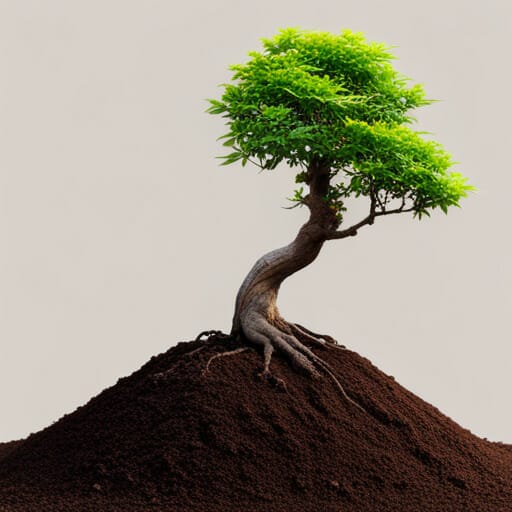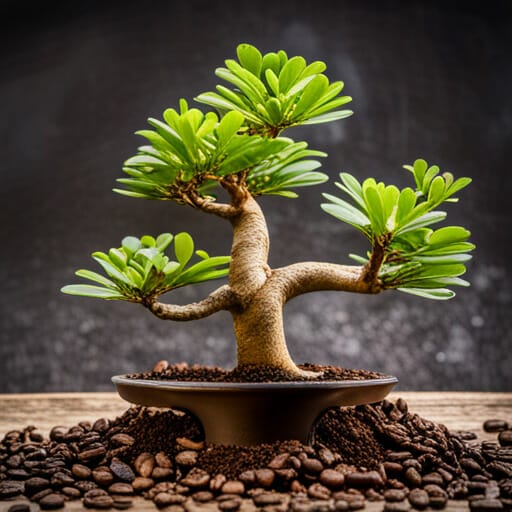Gardening enthusiasts are constantly seeking innovative methods to enhance the care of their bonsai trees. One such method that has sparked significant debate is the use of coffee grounds as a fertilizer.
While coffee grounds do contain nitrogen, a nutrient beneficial for plant growth, their immediate impact on bonsai trees remains uncertain. The primary concern is that coffee grounds need time to break down and release nutrients, leading to unpredictable effects on these delicate plants. Moreover, applying coffee grounds directly to the soil surface can result in mold growth and hydrophobicity, potentially harming the bonsai tree.
However, there are alternative ways to utilize coffee grounds in the garden, such as incorporating them into compost or utilizing them for worm fertilizer production. This article will explore the pros and cons of using coffee grounds for bonsai care, as well as provide alternative methods to ensure the well-being of these miniature trees.
By delving into these considerations, gardeners can make informed decisions that will ultimately serve the needs of their bonsai trees effectively.
Contents
- 1 Quick Points
- 2 Pros of Coffee Grounds
- 3 Cons of Coffee Grounds
- 4 Alternatives for Bonsai Care
- 5 Frequently Asked Questions
- 5.1 Can coffee grounds be used as a bonsai fertilizer for indoor bonsai trees?
- 5.2 How long does it take for coffee grounds to break down and release nutrients for bonsai trees?
- 5.3 Is there a recommended amount of coffee grounds to use for bonsai trees?
- 5.4 Can coffee grounds attract pests or develop mold when used on bonsai trees?
- 5.5 Are there any specific precautions or tips for using coffee grounds on bonsai trees to avoid moisture retention issues?
Quick Points
- Coffee grounds contain nitrogen, which is beneficial for plant growth, but their immediate impact on bonsai trees is uncertain.
- Coffee grounds need time to break down and release nutrients, and applying them directly to the soil can lead to mold growth and hydrophobicity.
- Alternative ways to use coffee grounds for bonsai care include incorporating them into compost or using them for worm fertilizer production.
– While coffee grounds can improve soil structure and water retention, they may not provide all the necessary nutrients for bonsai trees, so specialized bonsai fertilizers are recommended for balanced nutrition and immediate nourishment.
Pros of Coffee Grounds

One advantage of using coffee grounds for bonsai care is that they contain nitrogen that can be released and utilized by bonsai trees after being processed by microorganisms. Nitrogen is an essential nutrient for plant growth, and it plays a crucial role in the development of leaves and stems.
By providing a slow-release source of nitrogen, coffee grounds can contribute to the overall health and vigor of bonsai trees. Additionally, coffee grounds can improve soil structure and water retention when mixed with other organic matter. This can help create a favorable environment for root development and nutrient absorption.
However, it is important to note that coffee grounds need time to break down and release their nutrients, so their effects may not be immediate. Furthermore, using coffee grounds as a sole source of fertilizer for bonsai trees may not provide all the necessary nutrients, and it is recommended to use specialized bonsai fertilizers for optimal growth and health.
Cons of Coffee Grounds

A potential disadvantage of using coffee grounds for fertilizing bonsai trees is their tendency to develop mold and attract fungus gnats, which can be problematic for indoor bonsai trees.
Coffee grounds, when not properly managed, can create an environment conducive for the growth of mold and the presence of fungus gnats. This can lead to detrimental effects on the health of the bonsai tree.
Additionally, coffee grounds can become hydrophobic when dry, hindering the absorption of water by the roots and causing water blockage.
Moreover, the amount of nutrition that the bonsai tree receives from coffee grounds is difficult to determine, as coffee grounds take time to break down and release nutrients.
Therefore, it is recommended to use real fertilizers that are specifically formulated for bonsai care, as they provide more effective and controlled nutrient supply to the trees.
Alternatives for Bonsai Care

An alternative approach to nourishing and maintaining bonsai trees involves utilizing specialized fertilizers that are specifically formulated to meet the unique nutritional needs of these delicate plants. These fertilizers are designed to provide a balanced blend of essential nutrients, such as nitrogen, phosphorus, and potassium, that are necessary for the healthy growth and development of bonsai trees.
Unlike coffee grounds, which may take time to break down and release nutrients, specialized bonsai fertilizers are formulated to be readily available to the tree’s roots, providing immediate nourishment. Additionally, these fertilizers are often pH balanced, ensuring that the soil remains within the optimal range for bonsai growth.
By using these specialized fertilizers, bonsai enthusiasts can provide their trees with a reliable and effective source of nutrition, promoting strong and vibrant growth.
Frequently Asked Questions
Can coffee grounds be used as a bonsai fertilizer for indoor bonsai trees?
Coffee grounds are not recommended as a fertilizer for indoor bonsai trees. While they contain nitrogen that can be used by bonsai trees, they have no immediate effect and can cause problems such as mold, hydrophobicity, and issues with moisture retention. Real fertilizers are more effective.
How long does it take for coffee grounds to break down and release nutrients for bonsai trees?
Coffee grounds can take several months to break down and release nutrients for bonsai trees. However, the exact time frame can vary depending on factors such as temperature, moisture, and the presence of microorganisms.
Is there a recommended amount of coffee grounds to use for bonsai trees?
The recommended amount of coffee grounds for bonsai trees is difficult to determine due to the varying nutrient content and the potential issues they can cause. Real fertilizers are more effective for providing specific nutrients to bonsai trees.
Can coffee grounds attract pests or develop mold when used on bonsai trees?
Coffee grounds can attract pests and develop mold when used on bonsai trees. The moisture and organic matter in coffee grounds make them a breeding ground for fungus gnats. Additionally, coffee grounds can develop mold if they are not properly processed or if they are kept in a moist environment.
Are there any specific precautions or tips for using coffee grounds on bonsai trees to avoid moisture retention issues?
To avoid moisture retention issues when using coffee grounds on bonsai trees, it is advisable to refrain from using them altogether. Real fertilizers are more effective and reliable for providing the necessary nutrients to bonsai trees.




